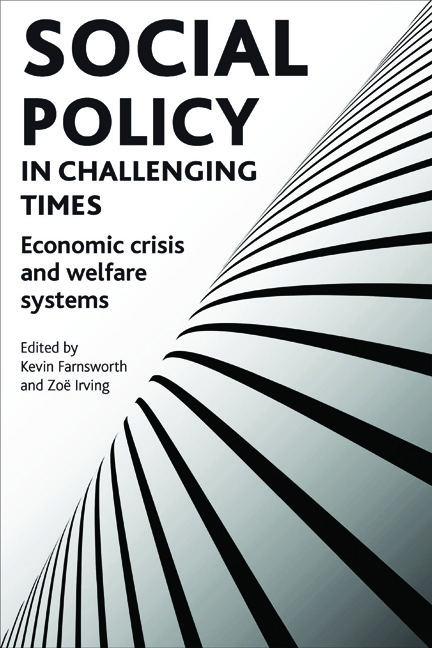Book contents
- Frontmatter
- Contents
- List of figures and tables
- Notes on contributors
- Acknowledgements
- one Varieties of crisis
- two The economic crisis and paradigm change
- three From financial crisis to fiscal crisis
- four Credit crunch, inequality and social policy
- five Global social policy responses to the economic crisis
- six Poverty, the crisis and social policy responses developing countries in developing countries
- seven South Korea after the 1997 economic crisis: a ‘paradigm shift’?
- eight China's response to crisis: what role for social policy?
- nine Tiptoeing through crisis? Re-evaluating the German social model in light of the global recession
- ten Ireland and the impact of the economic crisis: upholding the dominant policy paradigm
- eleven Waving not drowning: Iceland, kreppan and alternative social policy futures
- twelve Experiences from two financial crises in the Nordic welfare states: 1990-93 and 2008-10 compared
- thirteen Social policy and the recent economic crisis in Canada and the United States
- fourteen From economic crisis to a new age of austerity: the UK
- fifteen Responding to the challenges: some concluding remarks on welfare futures in changed circumstances
- Bibliography
- Index
eleven - Waving not drowning: Iceland, kreppan and alternative social policy futures
Published online by Cambridge University Press: 07 September 2022
- Frontmatter
- Contents
- List of figures and tables
- Notes on contributors
- Acknowledgements
- one Varieties of crisis
- two The economic crisis and paradigm change
- three From financial crisis to fiscal crisis
- four Credit crunch, inequality and social policy
- five Global social policy responses to the economic crisis
- six Poverty, the crisis and social policy responses developing countries in developing countries
- seven South Korea after the 1997 economic crisis: a ‘paradigm shift’?
- eight China's response to crisis: what role for social policy?
- nine Tiptoeing through crisis? Re-evaluating the German social model in light of the global recession
- ten Ireland and the impact of the economic crisis: upholding the dominant policy paradigm
- eleven Waving not drowning: Iceland, kreppan and alternative social policy futures
- twelve Experiences from two financial crises in the Nordic welfare states: 1990-93 and 2008-10 compared
- thirteen Social policy and the recent economic crisis in Canada and the United States
- fourteen From economic crisis to a new age of austerity: the UK
- fifteen Responding to the challenges: some concluding remarks on welfare futures in changed circumstances
- Bibliography
- Index
Summary
Introduction
As a small island state with a population of less than half a million, Iceland does not generally feature as a country case study in comparative texts, even those with an interest in Nordic social policy (for example, Kautto et al, 1999). The place of small island states in the world order more widely has hitherto been of interest only occasionally: as pieces in larger geopolitical jigsaws put together in studies in international relations (Cyprus, Gibraltar and Malta for example); as examples of economic success against the odds in development studies (Singapore for example); or as wayward bastions of capitalism's less palatable underbelly, in the reporting of financial exposés (the Cayman Islands for example). Oddly enough, in the context of the present economic turmoil, Iceland exhibits all three of these dimensions of 21st-century ‘islandness’. Both its geopolitical history and post-war economic growth strategy, as well as its more recent foray into the realms of international financial markets, make it a key player in, and a symbol of, the recent systemic collapse of global finance. However, in terms of its social politics, past, present and future, analysis of Iceland also demonstrates that there is little that is predetermined or predictable in responding to economic collapse, that it is political choices that govern social outcomes and that nation states are not victims of global circumstance.
Iceland is well known for having the oldest Parliament in Europe and the sagas that recount its distinctive medieval political history are an essential element of the island's cultural heritage and national identity. In order to understand the modern-day saga of Iceland's 21st-century history culminating in national bankruptcy, it is necessary to outline some significant aspects of its previous ‘1,100 years’ (Karlsson, 2000). The temporal context is, as Pierson (2004) has argued, crucial to the fuller understanding of social processes, drawing our attention to mechanisms, sequencing and events that are lost in analyses of single moments. Citing Abbott's ‘strict sense’ of the meaning of context that concerns the use of ‘defining locational information’ (Abbott, 1997, p 1171, cited in Pierson, 2004, p 168), Pierson's methodological preference for thicker descriptions encourages historical analyses informed by the study of the multifaceted dimensions of political life.
- Type
- Chapter
- Information
- Social Policy in Challenging TimesEconomic Crisis and Welfare Systems, pp. 199 - 218Publisher: Bristol University PressPrint publication year: 2011



